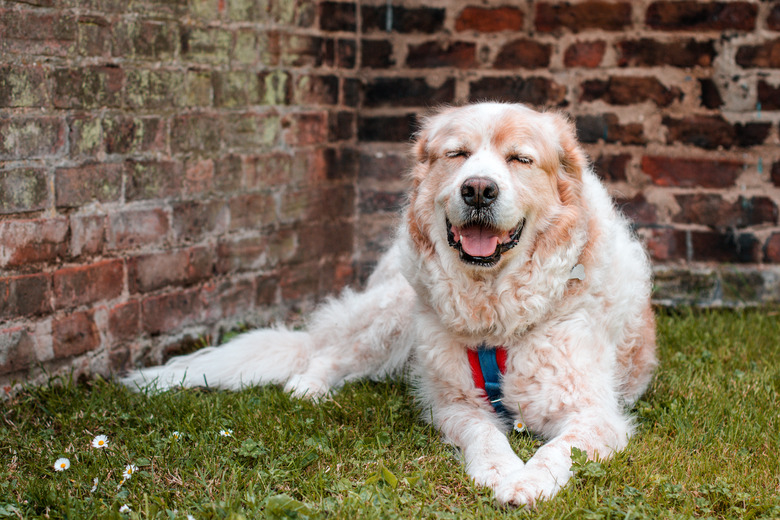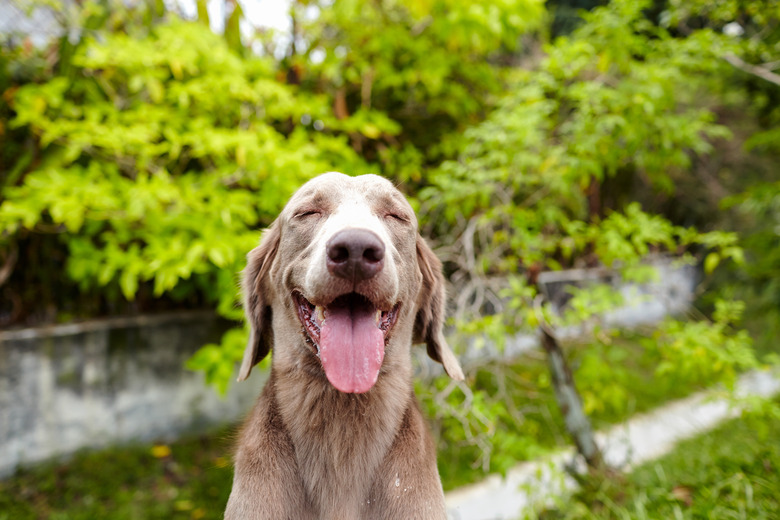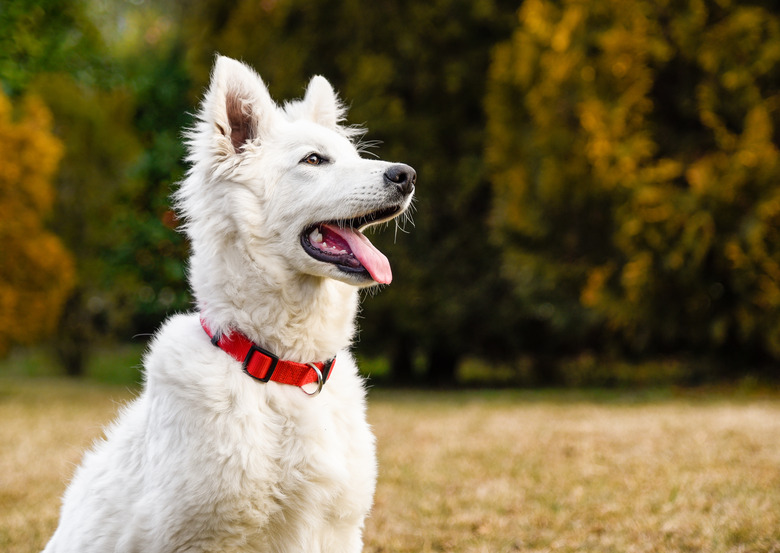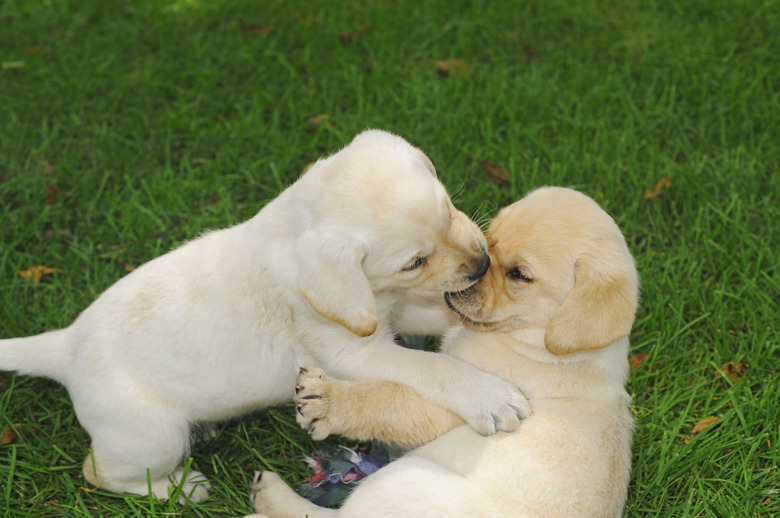Why Do Dogs Always Keep Their Mouth Open?
Why Do Dogs Always Keep Their Mouth Open?
Dogs are adorable and sometimes, adorably dopey looking. Have you ever noticed the derpy face of a dog who sits around all day staring at you lovingly with their mouth hanging wide open and wondered, "Why are you making that ridiculous face?" We spoke with Dr. Shagufta Mulla, a veterinarian with a DVM degree from Colorado State University with 20 years of experience as a small animal veterinarian, to find out the common reasons your dog is constantly leaving their mouth open.
Why do dogs have their mouth open most of the time?
Why do dogs have their mouth open most of the time?
If it feels like your dog constantly has their mouth open, that's because an open mouth serves several functions for a dog. A dog's mouth plays a role in breathing, cooling, and communication, so there are a lot of reasons your dog might be slack-jawed. First, an open mouth is a great way for an overheated dog to cool down. It's also a way your dog might try to communicate with you. Panting could be a sign of pain or fear, while a soft open mouth (that face that almost looks like a smile) communicates submissiveness and calm. Also, dogs sometimes breathe through their mouth.
Why do dogs breathe with their mouth open?
Why do dogs breathe with their mouth open?
If your dog is a major mouth-breather, there are a number of common reasons. When a dog has just exercised or spent time in the heat, there's a good chance their mouth is open to help them cool down. Because dogs don't sweat through their skin like humans (but they can sweat through their paws, notes Dr. Mulla) opening their mouth is their primary way of maintaining a cool and healthy body temperature.
Sometimes, it's a matter of body language. Dogs also breathe with their mouth open when they're anxious or especially excited and happy. If your dog is standing with their legs wide apart and neck stretched out while they're open-mouth breathing, take note because this could be a sign that your dog is having trouble breathing and needs to go to the veterinarian immediately.
Why do dogs pant?
Why do dogs pant?
If your dog is panting in an excessive or weird way (not the usual "I'm super hot and trying to cool down" pant you're used to), there are a few things that might be happening. Your dog may be scared or anxious and trying in their own way to ask for help during a stressful situation. It could also be your dog's way of trying to let you know they're in pain. The moral of the story is that excessive panting should not be ignored.
"Brachycephalic breeds like Frenchies and bulldogs are very prone to getting overheated a lot faster than dogs with longer faces," says Dr. Mulla, so paying attention to panting from heat or exertion is crucial in these breeds. "Shorter-faced breeds have less surface area in their mouths to carry out the evaporative cooling process of panting. And if not addressed in a timely manner, this can be fatal," says Dr. Mulla "It's ideal to take water along for your dog on walks or hikes, but especially so for our smooshy-faced friends."
Why do dogs sit with their mouth open?
Why do dogs sit with their mouth open?
If your dog is sitting still with their mouth open, it's time to look closer for clues. First, remember that an open mouth is your dog's personal air-conditioning system to regulate body temperature. If they've just been running around on a hot summer day, they might be taking a literal breather to cool down. If that's not the case, there are clues to look for.
If your dog's mouth is hanging open in a soft, casual position (lolling tongue optional), they're saying, "I'm having an awesome day and I love you so much." This open-mouthed face means you have a happy dog.
If their mouth is open and they're panting heavily, your dog is most likely overheated. Give them a drink of water and find some shade.
If the corners of their open mouth are pulled back, this is known as a fear grimace, and it tells you a lot about your dog's emotional state.
If the corners of the open mouth are pushed forward, resembling a slightly puckered mouth, this tells you that your dog is willing to take an offensive stance and is feeling quite confident.
If your dog is baring their front teeth with an open mouth, it is not the time to snuggle. This facial expression is a signal of aggression and means your dog is majorly on edge. Maybe they feel threatened or afraid. Whatever the case, the best thing you can do is be aware of any triggers in the environment and remove your dog from whatever is causing anxiety as soon as possible. If aggressive behavior continues, you should contact a professional dog trainer to get to the root of your dog's issues and help them overcome them and live a happier, more well-adjusted life.
Why do dogs open their mouth while playing?
Why do dogs open their mouth while playing?
If you've ever had a near freakout (or a full-on freakout — let's be honest, all dog owners have) at the dog park because your dog lunged at one of their best friends with an open mouth, know that there's (probably) no need for alarm. Often, dogs play with their mouths open, nipping and jawing each other.
This kind of dog play is called jaw sparring, and it's healthy and normal for dogs. While it might look like a fight, if there's no yelping or growling happening, know that the dogs are just having fun. It's like when human kids make fake cardboard swords and pretend to be knights fighting to the death — they're mimicking something dangerous, but in a harmless way.
Why do dogs open and close their mouth repeatedly?
Why do dogs open and close their mouth repeatedly?
If your dog is opening and closing their mouth over and over, keep an eye on them. While panting and open-mouth breathing can be normal parts of a dog's life, repeatedly opening and closing the mouth is usually a sign that something is amiss.
It could indicate something small, like a piece of food or a string from a recently demolished toy is stuck uncomfortably between their teeth, or it could be something more serious, like a broken or infected tooth, or a neurological issue. "A sign of distemper is called 'chewing gum fits,' because that's exactly what it looks like," says Dr. Mulla.
It could also be a sign that your pet is feeling nauseous. "Being nauseous often shows up as mouth licking and/or drooling," says Dr. Mulla. Inspect your dog's mouth for foreign objects or dental issues, like an abscess, and if the behavior continues, call your veterinarian to be safe.
What causes excessive panting in dogs?
What causes excessive panting in dogs?
Open-mouth breathing and panting can be traced back to several root causes. However, if panting becomes excessive and more than what's normal for your pup, it could be a real problem.
Some causes of excessive panting in dogs include:
- Heat exhaustion (vigorous, heavy panting)
- Heat stroke (rapid, shallow breathing)
- Medical conditions, such as anemia, congestive heart failure, and Cushing's disease
- Certain medications, such as prednisone
- Poisoning
- Allergic reaction
- Obesity
"Rapid but shallow breathing is a sign of heat stroke and vigorous, heavy panting is a sign of heat exhaustion," says Dr. Mulla. "Heat exhaustion comes before heat stroke."
Should you worry about some dogs panting more than others?
Should you worry about some dogs panting more than others?
Yes, brachycephalic breeds, like pugs, Frenchies, and other bulldog breeds, are very prone to getting overheated a lot faster than dogs with longer faces. The reason is that shorter-face breeds have less surface area in their mouth to carry out the evaporative cooling process of panting. If not addressed in a timely manner, this can be fatal. It's ideal to take water along for your dog on walks or hikes to help control body temperature but especially so for brachycephalic breeds.
If your dog appears to be in distress, call your veterinarian immediately. If they've been exerting themselves or it's especially hot outside, get them somewhere cool and make sure they have access to plenty of cold water.
"If your dog's rectal temperature is higher than 105, then use a sponge to apply cool (not cold) water onto the body, especially the chest and belly," says Dr. Mulla. "Re-take the temperature every few minutes. Stop cooling once the body temperature reaches 103 because if you keep trying to cool your dog, their temp may then continue to decrease to dangerously low levels." Dr. Mulla says that even though you have gotten the temperature to go down, your pet should still be taken to the veterinarian. "And if you are trying to lower the body temperature wit cool water and you aren't able to get the temperature to drop much or at all after a few minutes, go straight to the vet," Dr. Mulla says. she goes on to say that with flat-face (brachycephalic) breeds, use the cooling method while on the way if you can because these dogs are more likely to be in a life-threatening situation.
The bottom line
The bottom line
If you wonder why your dog often has their mouth open, the answer could be one of many common reasons. They might be simply breathing, or cooling off, or communicating. If they are panting, they are most likely overheated. Give them some water to help them cool down. If you see excessive panting or habitual opening and closing of their mouth, a medical issue could be at the root of it, and you should consult your veterinarian.



